Rasa Juknevičienė © kmu.gov.ua
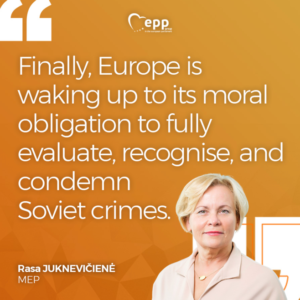
Rasa Juknevičienė has spent her life fighting political battles for the victims of tyranny. Her maternal grandfather was deported to Siberia where he suffered torture in a Soviet labour camp. Other members of her mother’s family were deported merely for being teachers. Such injustices were common under the quixotic rule of Josef Stalin, who imposed draconian punishments for even minor infringements of his laws, according to Oleg V. Khlevniuk in his brilliant biography of the Soviet dictator, called simply “Stalin”. Those parts that the Soviet Union had swallowed up suffered especially harshly. “For the years 1944 – 1952, according to incomplete official statistics,” Khlevniuk wrote, “approximately a half million people were killed, arrested, or forcibly exiled from Lithuania, Latvia and Estonia, along with an equal number in the western provinces of Ukraine.” Stalin imposed savage punishments, too, such as sentencing a parent to many years in a labour camp just for stealing a small amount of bread to feed to starving children, of whom the country had many. Khlevniuk writes that Stalin’s actions “upended or utterly destroyed millions upon millions of lives.” Now Vladimir Putin seems set on doing much the same in Ukraine and other territories once ruled from Moscow back in the days when the Soviet Union was a major political power.
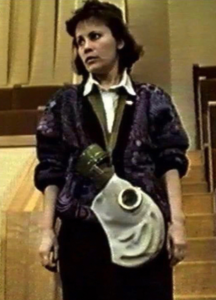
It was the treatment of her maternal grandfather that set Juknevičienė on the road towards a life of politics. It also led her into working closely with Vytautas Landsbergis, the much-admired leader of Lithuania’s Reform Movement. He invited her to work as a press secretary for the centre-right Homeland Union political group in the Lithuanian Parliament when she was still working as a paediatrician. After that, she wrote, “the real school of politics began”. She was elected to the Supreme Council of the Lithuanian Republic in 1990 and in that same year she voted for the restoration of Lithuania’s independence. She was able to watch the collapse of the Soviet Union from ‘up close’ and became her country’s first female defence minister, going on to become the first woman ever to serve as President of the NATO Parliamentary Assembly.
Juknevičienė has admitted being influenced by the writings of Nijolė Alfonsa Gaškaitė-Žemaitienė, an historian, prose writer, poet, and essayist much disliked by the Soviet authorities who ultimately executed her, although not before torturing her first. I have not been able to source her influential book, Zuvusliuju Prezidentas, which translates as President of the Dead, or of the Fallen, and which in fact records the biography of Jonas Žemaitis, Chairman of the Presidium of the Council of the Lithuanian Freedom Struggle Movement. It includes documents from the country’s archives and photographs of people and events associated with the freedom movement, which for many years he led, sometimes under his nom de guerre, Vytautas. He led a group of anti-Soviet partisans known as “the Forest Brothers”, because they lived in underground bunkers, deep in the forests, always hunted by the Russian army. It was a very difficult time for Lithuania and its people, and it was clear throughout that Moscow was in charge. However, Jonas Žemaitis-Vytautas is still seen as a national hero, having led his little group against the mighty Soviet Union. The only way to show defiance to the Soviet forces in occupation was by joining a partisan group, so it comes as no surprise that Rasa Juknevičienė is a modern-day admirer of his principled stand against the Soviet occupation that followed the Second World War.
| SOME COUNTRIES NEVER CHANGE
It would appear that Vladimir Putin’s ultimate aim is the subjugation and occupation of Ukraine, just as his country occupied Lithuania after the War. He apparently believes it’s really part of Russia and should not have an independent existence. Standing up to Moscow is only a little easier now than it was in the 1940s. A fairly large number of Lithuania’s partisan heroes have been commemorated with statues, or by having streets or schools named after them. Quarter of a century ago few people had even heard of Jonas Žemaitis, even among native Lithuanians. In fact, his heroism is debatable; it is the triumphalist war stories that create legends, not always justly.
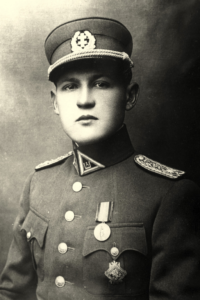
Jonas Žemaitis has been described as pompous with an inflated ego when he became an officer. He also became involved in street-fighting, which hardly seems very heroic. He may also have been one of a group of deserters who surrendered himself to the Germans, but that’s not something that Lithuanian patriots like to talk about. And it may not even be correct, of course. It’s also true to say that even if people like Žemaitis-Vytautas were not the flawless heroes the stories like to convey and even if he swore undying allegiance to Adolf Hitler when he joined the Auxiliary Police Service Battalion, in the end his service to his country and its independence was valuable, which is presumably why he still has the admiration of Juknevičienė, who would clearly never have aligned herself with the Nazis.
Neither, of course , would she ever align herself with Putin and his acquisitive greed and cruelty. She made that clear in a speech at the European Parliament in January, when members debated setting up a special tribunal to deal with war crimes in Russia’s continuing aggression towards Ukraine. “The European Parliament will adopt the right and necessary resolution on a special tribunal for Kremlin crimes of aggression,” she told her Parliamentary colleagues. “But will there be enough courageous heads of state who will establish such a tribunal without delay? Let us hope so.” That’s a fairly widespread hope, but she knows it’s not universal. “We have shown incredible unity,” she said, “but every time the Russians hit the Ukrainian people’s homes with horrific missiles, I feel guilty that we are not doing enough. We need to overcome our own fears and act with much more determination. Are we so weak that we cannot allocate enough weapons and resources and make the terrorists in the Kremlin stop? No, we are not weak. Let us do everything we can.” It remains to be seen if her hopes will be realised.
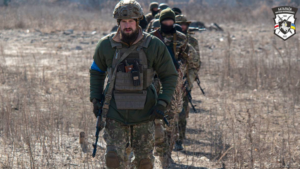
Juknevičienė is also very angry with the President of Belarus, who is certainly on Putin’s side in the conflict, even if his country is (thankfully) not doing much about it. Juknevičienė has made it clear that Lukashenko should not be in a position of power. In a debate at the European Parliament about Ukraine in January 2023, she reminded her fellow-MEPs: “there is the war criminal and usurper Lukashenko, and there are the people of Belarus on the other side.” Juknevičienė reminded MEPs that a majority of the citizens of Belarus don’t agree with their President and are consequently paying the price for it. “Thousands of them are imprisoned; most of them are silenced in captivity, but it will not always be like this. Belarus will be free because Ukraine will win. That is why the Kastuś Kalinoŭski Regiment (made up of Belarusian volunteers opposed to their country’s government and to Vladimir Putin) is fighting on the Ukrainian front against Russia, and that is why Belarusia’s President-elect Sviatlana Tsikhanouskaya and other leaders of the Belarusian people are working actively through diplomatic means. Many Belarusians – perhaps a majority – believe she won the 2020 election but it was rigged and she was unable to take office. Since she cannot take that post, she now fulfils the rôle of “National Leader”, supported by a United Transitional Cabinet, representing Belarus in international organisations. Tsikhanouskaya, who is a teacher in Belarusia, is the leader of the Belarusian democratic movement. She ran in the 2020 Belarusian presidential election as the main opposition candidate after her husband Sergei Tikhanovsky was arrested in Hrodna by Belarusian authorities. He remains behind bars, regarded by Lukashenko as an enemy to his rule through his video blogs on YouTube, and also his long-term campaigning against Lukashenko’s very questionasble rule. Amnesty International, however, regards him as a “prisoner of conscience”. It’s worth reminding ourselves that the Kastuś Kalinoŭski Regiment, formerly known as the Kastuś Kalinoŭski Battalion, is made up of Belarusian opposition volunteers, formed to defend Ukraine and repel Russia’s invasion. By March 2022, it was claimed that more than a thousand Belarusians had applied to join. The unit is named after Konstanty Kalinowski, a Polish-Belarusian historical hero who led an uprising against the Russian (Tsarist) empire in Belarus in 1863.

Juknevičienė remains convinced that Ukraine will ultimately win, and she wants the European Parliament to be ready to deal with the consequences. “Both war criminals, Putin and Lukashenko, will be convicted in a special tribunal,” she told the House. “I believe that in my lifetime, Belarus, a nation with an honourable European history, will become part of the EU family. However, before that, Lukashenko and Putin have to be completely isolated and the EU has to continue to support the democratically elected leaders of Belarus, who are the real representatives of the people of Belarus.”
| HEROES AND VILLAINS
Back in March last year, the battalion’s deputy commander, Aliaksiej Skoblis, known by his nom de guerre, “Tur”, was killed when his unit was ambushed while attempting to defend Kyiv. In April 2022, Ukraine’s President, Volodymyr Zelensky awarded Skoblis the posthumous title ‘Hero of Ukraine’, “for personal courage and heroism in defending the state sovereignty and territorial integrity of Ukraine, loyalty to the military oath.” Zelensky and the Ukrainian people are aware of the courage shown by volunteers from other countries, who are determined to resist Putin’s aim to conquer neighbouring lands. Incidentally, Ukraine is far from being Juknevičienė’s sole concern. She is also one of the leading signatories of a motion condemning Iran’s barbaric treatment of its own citizens unless they support the country’s brutal leadership. Unsurprisingly, Juknevičienė is very outspoken about the cruelty of the Iranian government and its inclination to punish anyone not agreeing with its support for the brutal treatment of opponents and willingness to use the death penalty. In fact, Iran has the world’s highest per capita rate for executing its citizens, despite that line in the Qur’an (2:191-193) which states plainly that: “Allah is forgiving and merciful”. The Iranian courts are certainly not. But perhaps we should recall that the verse immediately preceding the reference to forgiveness and mercy urges Muslims to treat unbelievers rather severely: “Kill them wherever you find them,” says the Qur’an. The Iranian courts seem to follow that instruction quite strictly.
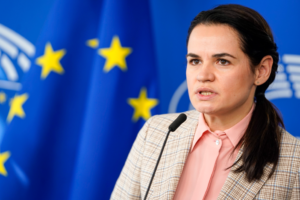
At present, of course, Juknevičienė is most concerned with Russia’s unwarranted and irresponsible war in Ukraine, which Putin seems to believe should belong to him. Much of her wrath is also directed at Lukashenko, too. In a debate at the European Parliament, Juknevičienė reminded the House that: “Lukashenko and Putin are holding the Belarusian nation captive and terrorised.” She went on to condemn the Belarusian leader for his apparent ambivalence about Ukraine. “Lukashenko is responsible not only for stealing the elections,” she told the House, “But also for giving Belarus’s sovereignty away to Russia. Lukashenko and the Iranian regime are helping Russia in its war of aggression against Ukraine. They are responsible for the war crimes. They must be sanctioned and face justice in an international tribunal.” She told her fellow-MEPs that “Lukashenko feels vulnerable and scared. He would have opened a second front against Ukraine, but he knows the true will of the Belarusian people – they are against the Russian aggression, they seek to be good neighbours for Ukrainians. The Kastuś Kalinoŭski Regiment in Ukraine, formed of Belarusian volunteers, is the true expression of that will.” Slava Ukraini, in other words. It means “Glory to Ukraine”.
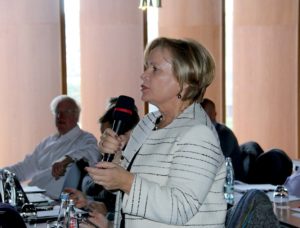
The problem usually is that leaders who find themselves with their backs to the wall can sometimes resort to violence because they can see no other way out. It’s certainly not fun for the Belarusians either, Juknevičienė told the House. “There are nearly 1,500 political prisoners of Lukashenko’s regime. The number is growing. I invite each one of you to become a godparent to one of the political prisoners. Your postcards, your telephone call to their family will be a precious signal of support.
Let’s make sure not one of them is forgotten.” It sounds like a very good idea, but then Juknevičienė is seldom short of those. And there is hope, she stated. “I also invite the European Parliament to formalise relations with a democratic Belarus, led by Sviatlana Tsikhanouskaya. Free and democratic Belarus is possible, but we have to help Ukraine to win this war. Ukraine’s victory will bring victory for free Belarus and free Russia. Let’s do our utmost to achieve this victory.” There’s no doubt that Juknevičienė is nothing if not ambitious and eager to deal with cruel dictators as they deserve.
| HOLDING CRIMINALS TO ACCOUNT
In speeches she has given at the European Parliament, Juknevičienė has described both Putin and Lukashenko as war criminals and Lukashenko as someone who is “holding the Belarusian nation captive and terrorised”. She has also questioned their political legitimacy. “Lukashenko is responsible not only for stealing the elections, but also for giving Belarus sovereignty away to Russia.” Belarus and its leader are not alone in their actions against the people of Ukraine through their support for Russia, even if many Belarusians don’t agree with their leader. Juknevičienė has also linked Lukashenko with Iran. “Lukashenko and the Iranian regime are helping Russia in its war of aggression against Ukraine. They are responsible for the war crimes. They must be sanctioned and face justice in an international tribunal.” She may have a long wait for that.
She is unlikely to move the Iranian government from its fixed and brutal position, apparently keen to retain its record for executing the greatest number of citizens. She is concerned about Georgia, too, which has expressed a wish to join the EU but which recently jailed a television journalist and media owner who had been critical of the government and clearly supported the opposition. In today’s interconnected world it would be easy to think that such politically motivated actions were matters from the past. They are not, it seems. “Georgia is Europe,” Juknevičienė tweeted, “But Georgia’s European path is put in question due to politicised justice in the country”. Juknevičienė is in favour of Georgia’s EU membership, but not at any price. The resolution on Georgia joining has been amended, but she still fears Russian influence.
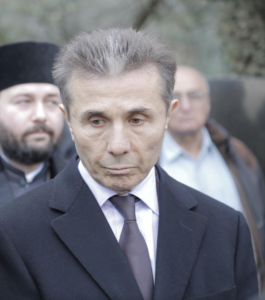
“First of all, we have to look at the full content of the resolution, because it has a lot of positive notes saying that we are in favour of the future of Georgia,” Juknevičienė said when commenting on the annual report on the implementation of Georgia’s Association Agreement. She said the MEPs supported having Georgia inside the European Union and also the country being granted candidate status. “The resolution was strengthened with amendments, among them were important (concerns) about Bidzina Ivanishvili’s possible ties with Russia and asking for the institutions to elaborate on that and if it is like that to impose sanctions not only on him but also on his closest surroundings (allies).” Georgian politician Ivanishvili is a businessman and philanthropist who was his country’s Prime Minister from October 2012 to November 2013, returning home from Russia in 2003, having made a fortune out of the privatisation craze. Some Georgians want to see the future develop in a pro-Western direction (presumably Ivanishvili does), while others – such as Putin and Lukashenko, of course – want to freeze it in its tracks.
Lukashenko has also adopted a worrying tactic to his anti-Lithuanian stance. He seems to be deliberately ferrying refugees into Lithuania in the hope of stressing the economy and arousing animosity towards the newcomers. Juknevičienė has warned that the migrants are being leveraged as a hybrid warfare tool in an effort to incite chaos, get revenge and turn the Lithuanian people against their government. “I am convinced that it is essential for Lithuania to currently maintain a strong value-based policy,” she said, “one that would have a clear final strategic goal for our neighbours to be democratic.” There have already been negative reactions to the influx of migrants, brought in from Turkey, Iraq and other countries, presumably willingly, with some local mayors condemning government policy. Juknevičienė and others believe the policy was thought up by Putin before it was implemented by Lukashenko. Links have been identified between the migrant policy now affecting Lithuania and France’s far right. Hitler may have been defeated but there are still a lot of people – far too many, one could say – who would like to implement his much-derided policies again and are happy to use migrants as a weapon of policy, having chosen not to view them as individuals with rights and opinions of their own.
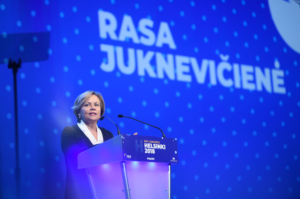
Juknevičienė wants the EU to develop a clear vision for its security, she told The Parliament Magazine. Certainly, her political career has taken her a long way, but she says she most enjoys being in her home town of Tiltagaliai, near Panevėžys, where she looks after her mother and spends time with her family. She also enjoys gardening and reading when she has time. The Parliament Magazine asked her what single item she would save if her house caught fire. The answer was her very beautiful white cat, Princess. I don’t blame her. At least cats are unaffected by policy decisions and political machinations. But the risks won’t melt away. As Khlevniak wrote in his biography of Stalin: “A significant portion of Russian society seeks recipes for the present by looking to the Stalinist past. Popular images of the greatness of the Stalinist empire – of equality and the fight against corruption, of the joy and purity of this distant life undone by ‘enemies’ – are exploited by unscrupulous commentators and politicians. How great is the danger that a blend of historical ignorance, bitterness, and social discontent will provide fertile ground for pro-Stalinist lies and distortions to take root”. Juknevičienė is determined that they won’t take root in Lithuania to turn back the clock to a blood-soaked past, nor anywhere in or near the EU. With the right support, she may well succeed.

